On August 4, the regular meeting of the steering committee of the ‘School Feeding and Child’s Welfare’ Agency took place at the National Center for Education Development and Innovations (NECID) under the chairmanship of Araksia Svajyan, Deputy Minister of Education and Culture of the Republic of Armenia.
Five members participated in the steering committee meeting:
– Araksia Svajyan – Deputy Minister of the RA EC
– Vahan Arakelyan – UN WFP(attended online)
– Shoghik Avetisyan – Doctor from the Department of Epidemiology of Infectious and Non-Communicable Diseases at the Ministry of Health
– Ani Ghazaryan – Social and Industrial Foodservice Institute (SIFI) of the Russian Federation”
-Mariam Mnatsakanyan- the Chief Organizer in the Public Health Department of the Ministry of Health
The meeting was also attended by Satenik Mkrtchyan, director of the “School Feeding and Child’s Welfare” Agency, employees of the agency, Artashes Torosyan, acting executive director of the National Center for Education Development and Innovation Foundation, and Nanna Skau, head of the UN WFP Armenia office.
This meeting was dedicated entirely to the report on the activities of the ‘School Feedings and Child’s Welfare’ Agency for the first and second quarters of 2023. Satenik Mkrtchyan, director of the agency, presented a comprehensive overview of its work across all areas on a semi-annual basis.
When discussing the enhancement of national structures for school meals, Mrs. Mkrtchyan highlighted several key initiatives during the reporting period. The institution provided support to international expert Nadia Goodman in developing strategy and action plan documents for the ‘School Feeding’ program.
They also facilitated property and equipment assessments (canteen and kitchen) provided to the schools in Marzes used in the “School Feeding” program , distributed bi-weekly, supplementary, and dry food menus to regional governments (Marzpetarans) and schools, collaborated with the UNWFP to create a methodological guide for regulating the provision of paid meals in public schools, and compiled several methodological manuals. The semester was really rich in terms of preparation of methodological manuals. These included a monitoring guide to improve team efficiency, guidelines for institution employees, cooks, and gardeners.The monitoring team has been assembled and has been ready for duty.
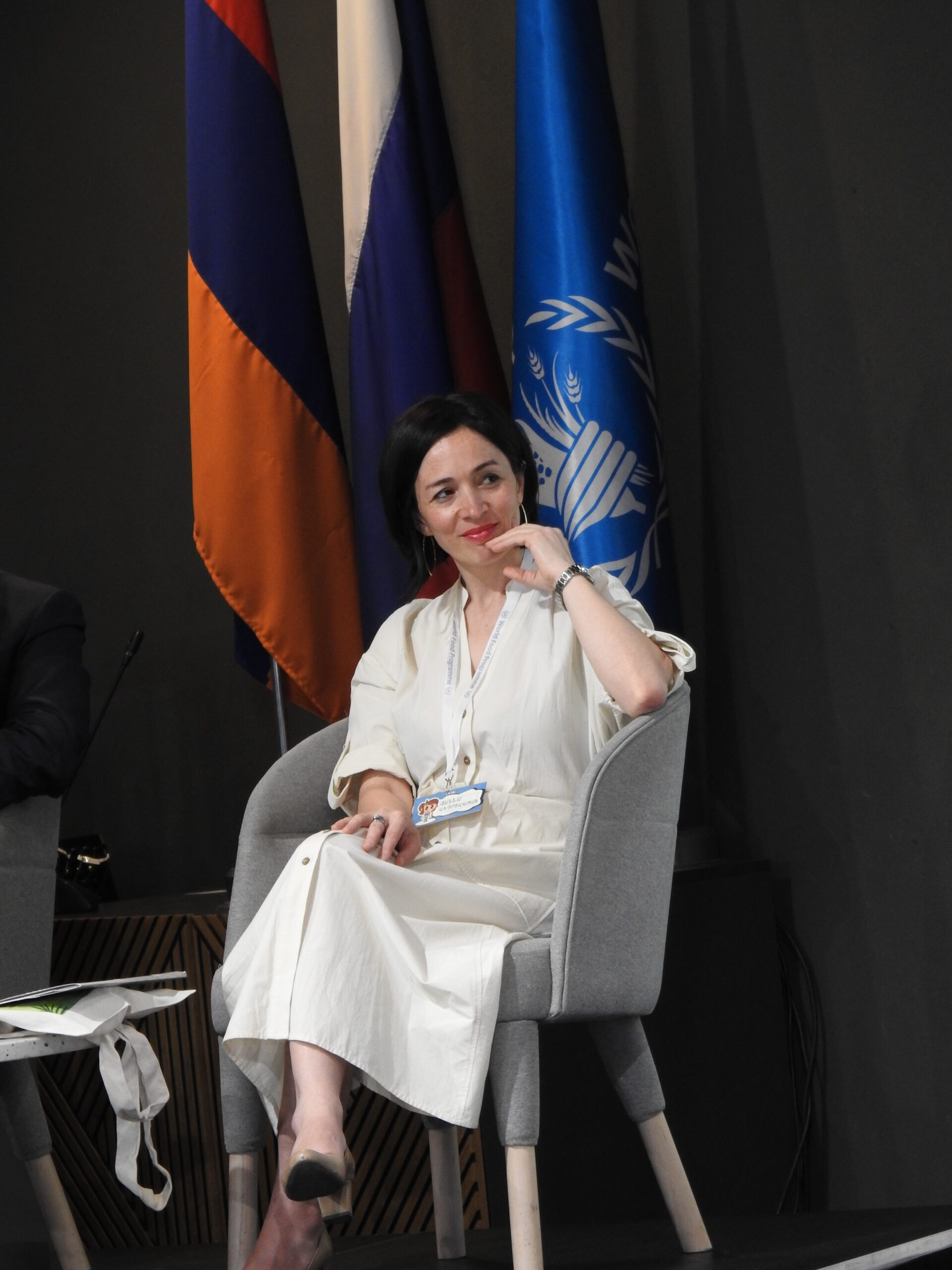
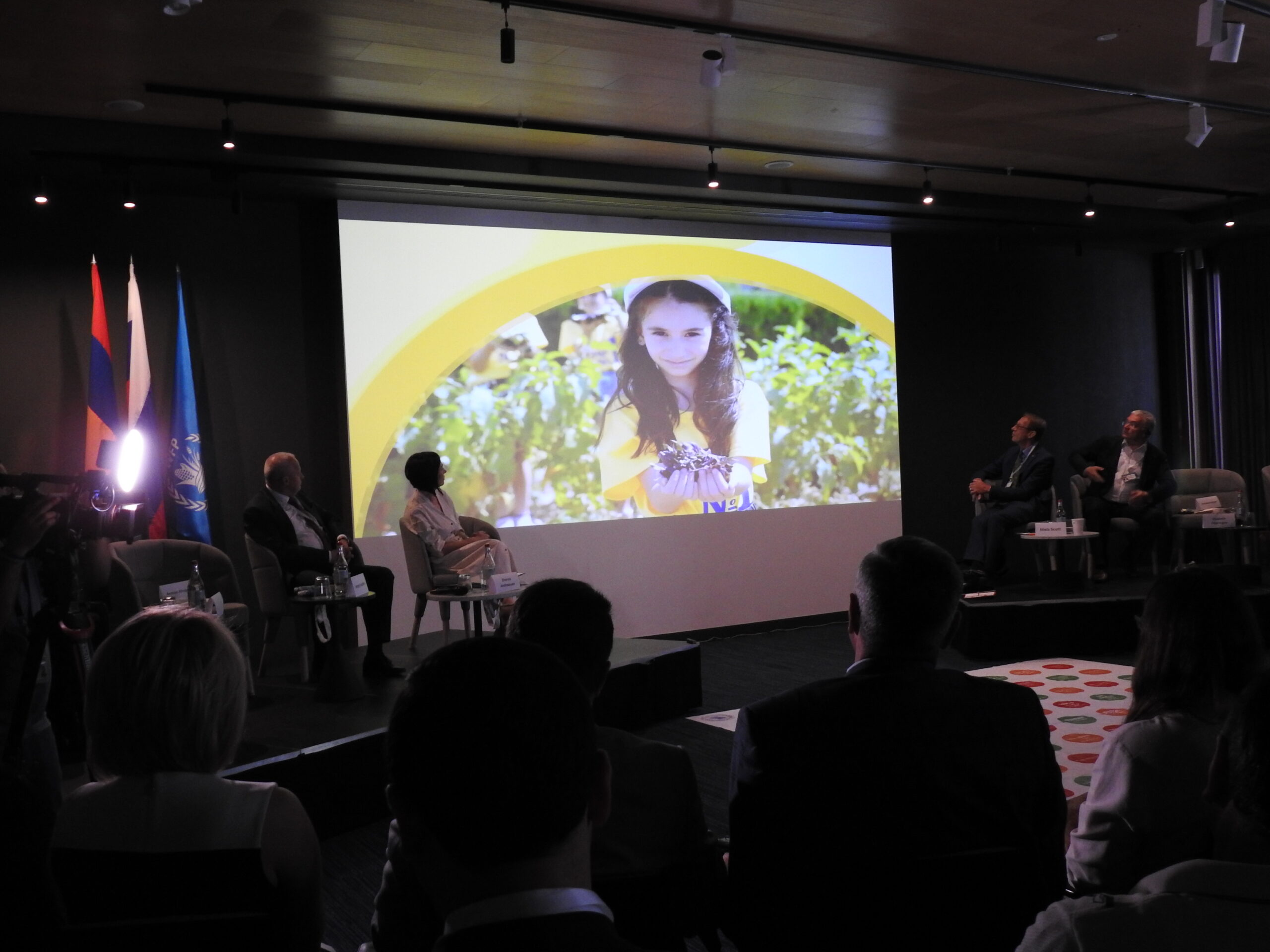
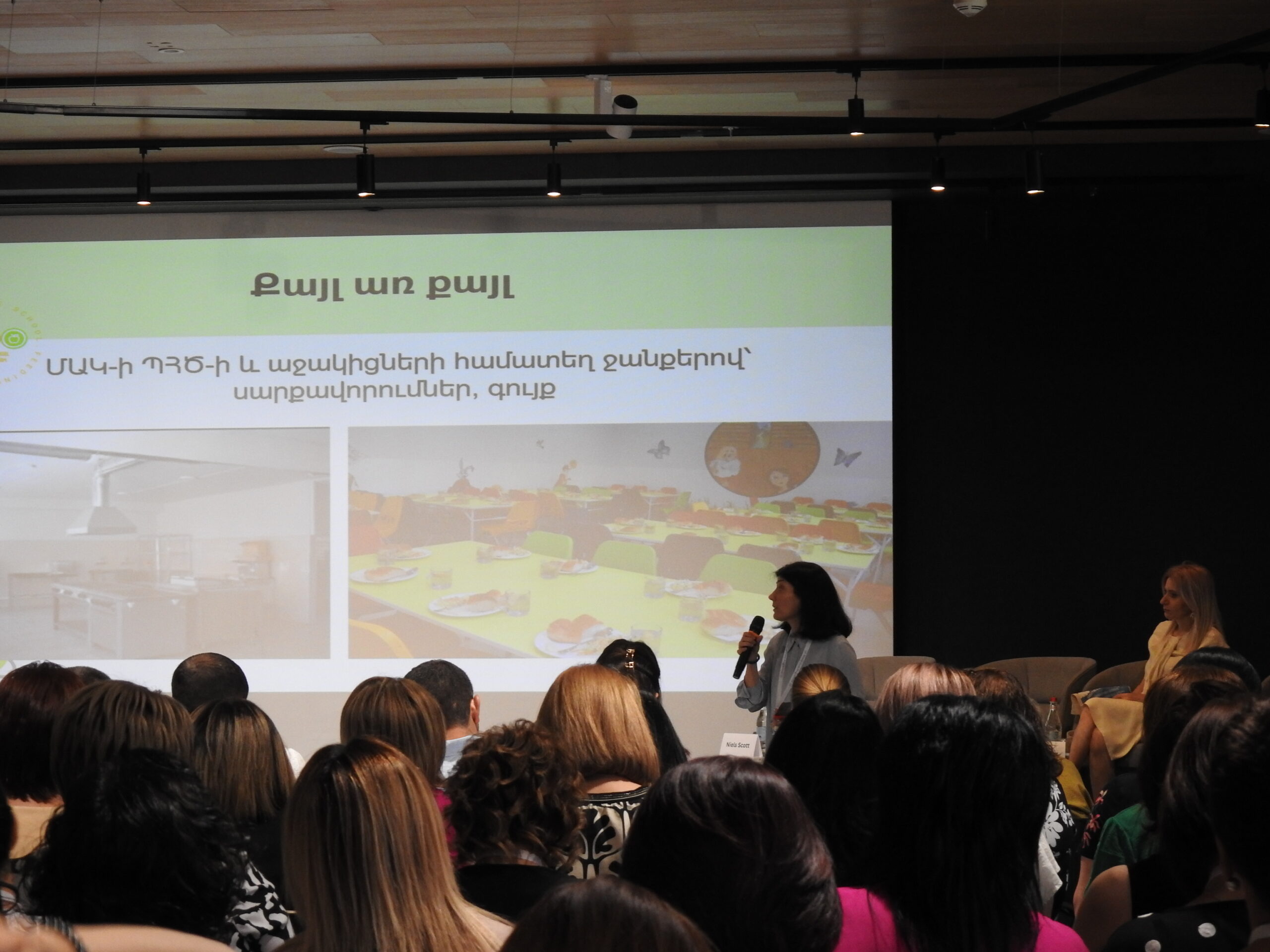
In the first quarter, 556 schools across 10 provinces were visited for monitoring purposes using recently updated questionnaires. The collected data were then summarized and stored in electronic databases. Additionally, monitoring was conducted on lessons related to the “Nutrition and Physical Activity” component of the “Healthy Lifestyle” course in schools within the Tavush region.
Satenik Mkrtchyan highlighted that the “School Feeding and Child’’s Welfare” Agency actively supported the organization of 6th and 8th grade classes focusing on the “Nutrition and Physical Activity” component of the “Healthy Lifestyle” course. This support included conducting courses for 90 teachers and holding an informational meeting attended by 60 school principals and residents of Tavush.
Taking into account that the website serves as a platform for promoting the School Feeding” program and its components, significant efforts were made in the first half of 2023 to enhance its content. This involved enriching sections such as the “Cook’s Corner” and “Parent’s Corner,” as well as preparing articles and videos for the website’s blog.
Mrs. Mkrtchyan highlighted the opening ceremony of the canteen of Ashtarak No. 4 School in Aragatsotn Marz, emphasizing that during this event, the premiere of the interactive performance titled “Travel to the Space of Healthy Food,” initiated by the “School Feeding and Child’s Welfare” Agency, took place.
Speaking about efforts to enhance school infrastructure and food provision, the director of the “School Feeding and Child’’s Welfare” Agency mentioned that the agency had been continuing capacity-building courses for stakeholders involved in the “School Feeding” program. A total of 2,582 participants, including directors, chefs, parents, and children, engaged in courses tailored to their respective groups. Each participant gained crucial insights and knowledge about the program.
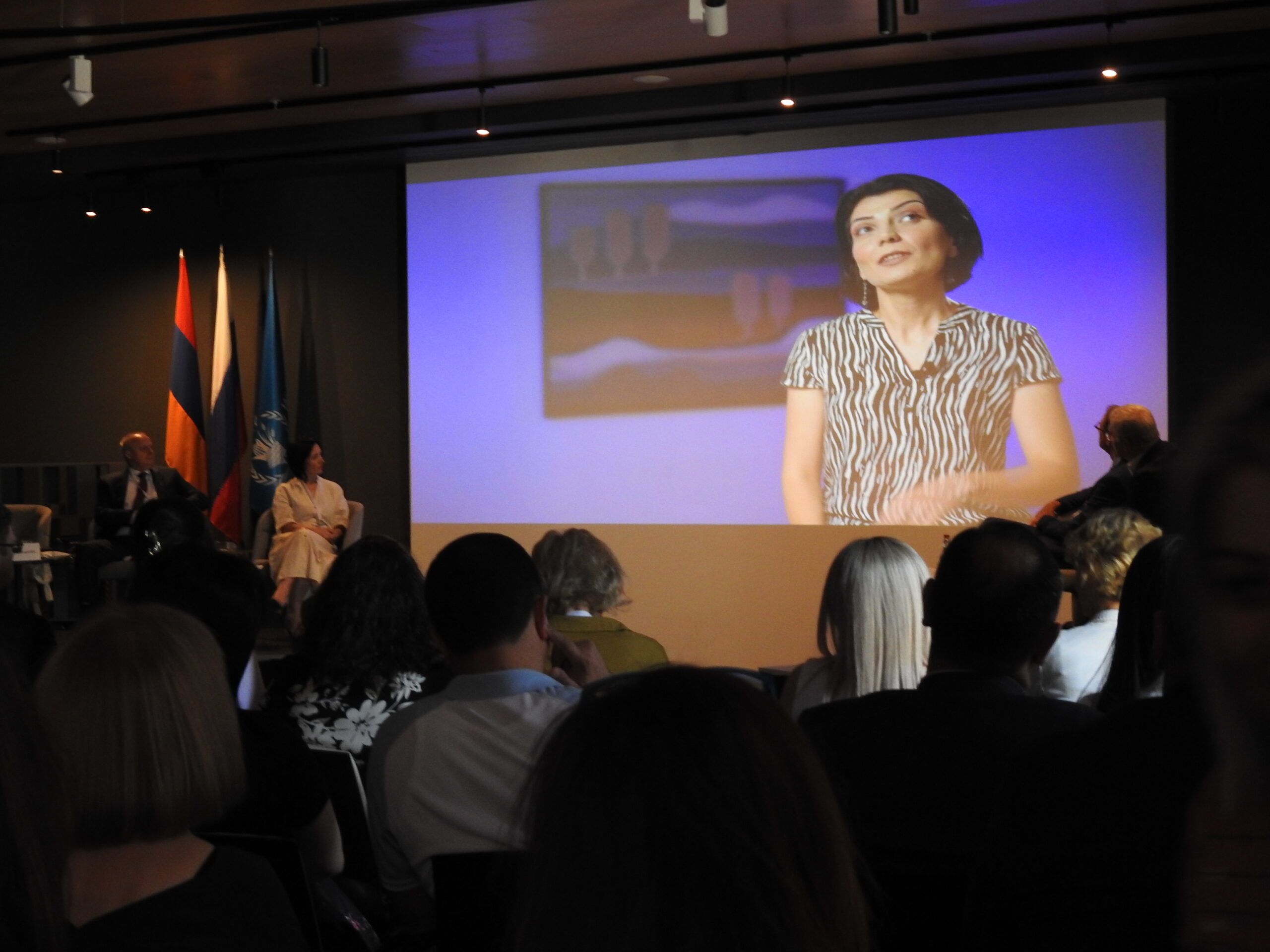
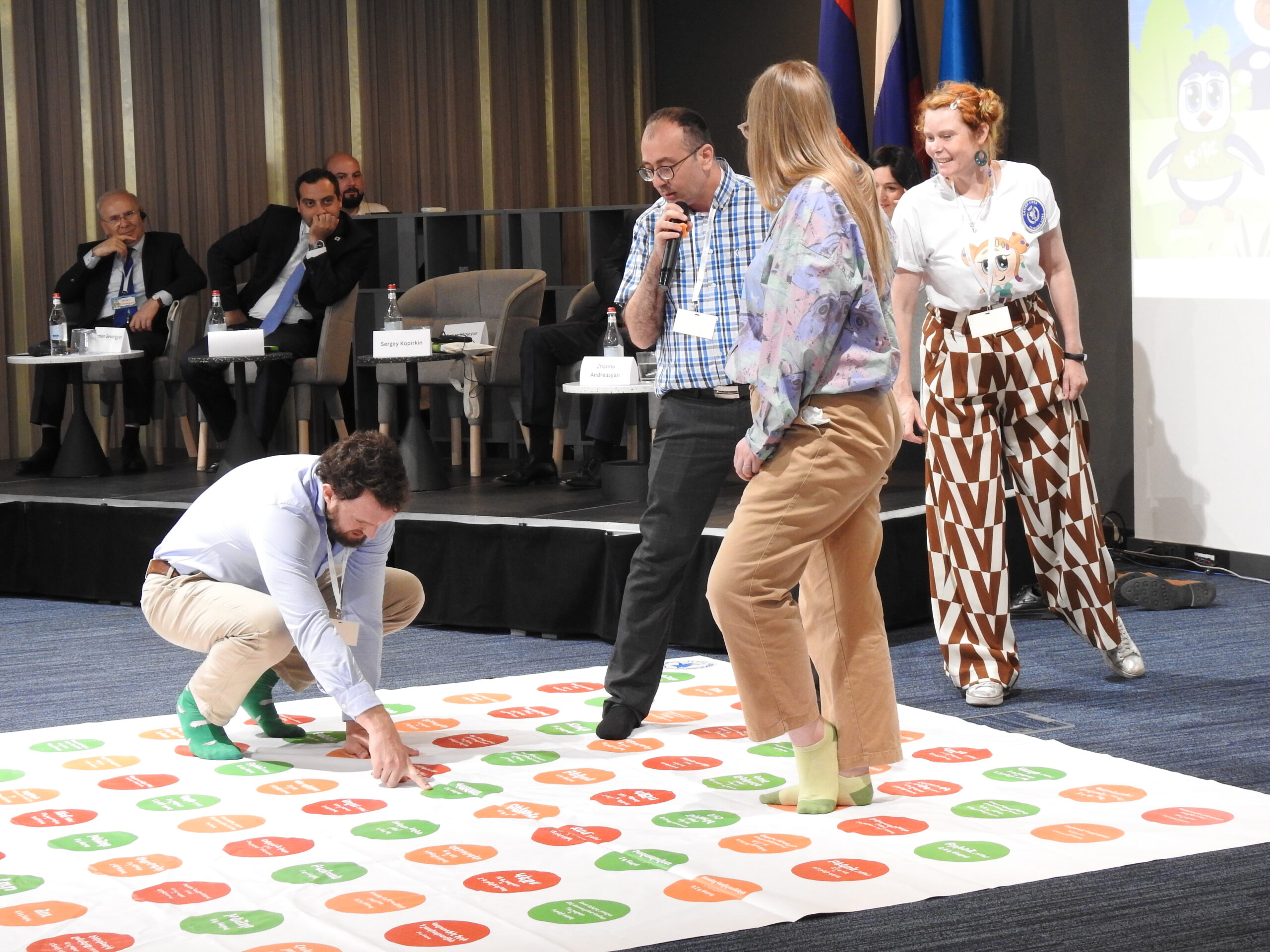

For instance, theoretical courses were arranged for directors, chief accountants, and individuals handling accounting duties. Both in-person and remote training sessions were conducted for the “Nutrition and Physical Activity” component of the mandatory “Healthy Lifestyle” group. Practical training modules were also provided for cooks focusing on the “School Food Preparation” module, among others. Separate platforms were established for courses in each region.
Ms. Mkrtchyan emphasized the ongoing efforts to integrate the city of Yerevan into the program, highlighting the outcomes derived from discussions with potential beneficiaries. She presented the summary of their discussions during the panel session at the official handover ceremony of the “School Feeding” program to the government. Additionally, she discussed the comparison of data obtained from the infrastructure survey with its results.
Addressing the infrastructures established adjacent to schools, designed to reinforce the program while serving as educational platforms for students, Satenik Mkrtchyan provided an update that 21 high-tech greenhouses, 19 intensive orchards, and 11 intensive fruit orchards have been established under the auspices of the UN World Food Program. She emphasized the necessity for legislative regulation in this field, noting its potential to significantly streamline the process of creating school infrastructure.
During the reporting period, the “School Feeding and Child’s Welfare” Agency expanded its staff by adding two agricultural workers who maintained continuous communication with schools, assisting in the proper upkeep of their gardens and greenhouses. They conducted 52 visits to school greenhouses and gardens.
The certification and remuneration of cooks remained a focal point for the management of the “School Feeding and Child’s Welfare” Agency. Prior to 2022, their salary stood at 15,000 drams each, leading to difficulties in filling cook positions and resulting in high turnover rates. Presently, current paid employees are declining work, directly endangering project implementation. The “School Feeding and Child’s Welfare” Agency has expressed its readiness to present a proposed draft outlining positions within the kitchen staff along with salary calculations, which has been submitted to the Ministry of Education, Science, Culture and Sports (MESCS).
The foundation’s recommendations were incorporated into the draft ORDER OF THE MINISTER OF EDUCATION, SCIENCE, CULTURE, AND SPORTS OF THE REPUBLIC OF ARMENIA NUMBER 79 DATED DECEMBER 7, 2022, REGARDING AMENDMENTS AND ADDITIONS. This draft was disseminated within the e-draft system.
During the first semester of 2023, significant efforts were directed towards engaging the parent community. Trainings were organized, involving parental participation, notably focusing on “The Health Importance of School Food for Parents” through a comprehensive three-day module program. Additionally, offline meetings were conducted with parent associations from specific schools.
Collaborative efforts were undertaken with UN WFP partners to revise, proofread, and finalize educational materials for the 5th, 6th, 7th, 8th, and 9th grades encompassing the “Nutrition and Physical Activity” component in public schools. In-person and part-time courses were organized specifically for teachers instructing the “Nutrition and Physical Activity” component, catering to 6th and 8th-grade levels, drawing a participation of 168 educators.
Simultaneously, engagement persisted with various segments of the public, aiming to garner potential support for the project. Methodological support was extended, involving two schools in the Tavush marz (Mosesgyugh and Varagagyugh), contributing to grant development to complete applications for the small grant programs of the German Embassy, subsequently submitting them for consideration.
Mrs. Mkrtchyan also mentioned that they reached out to Bagrat Sargsyan, the director of the Armenian branch of the Fund for Armenian Relief. They requested permission to utilize 3,002,000 AMD from the 3,863,956 AMD saved through the “AYO” fundraising initiative of the Fund for Armenian Relief. This amount would be allocated for purchasing dining room furniture, dishes, and kitchen utensils for the schools in Vayots Dzor. While dry food provisions were currently available, acquiring this property would enable them to offer hot meals to the children if supplies need to be replenished.
After the report presentation, the attendees directed questions to the director of the “School Feeding and Child’s Welfare” Agency. Deputy Minister Araksia Svajyan from the Ministry of Education, Science, Culture, and Sports inquired about the planned menu for fifth-grade and higher-grade children as part of the paid meals. She sought clarification on whether the menu would align with what is provided to elementary-grade children for free or differ from it.
Satenik Mkrtchyan conveyed that high school students would have access to the same menu, albeit with varying portion sizes adjusted to accommodate the specific needs of children in that age group. As a state program, the government’s strategy aims to enable access to nutritious, warm meals at school not only for elementary school children funded by the state but also for older students through parental contributions and state co-financing.
The program emphasizes a social aspect, hence menus for both adults and children cannot significantly differ in terms of food variety.
Mrs. Svajyan noted that she is very happy that the “School Feeding and Child’s Welfare” Agency supports the regional governors in matters related to the implementation of the “School Feeding” program and requested that the “School Feeding and Child’s Welfare” Agency conduct needs assessments in other marzes as well: in cooperation with the Ministry. It is desirable that the detailed work of mapping the needs of Shirak region should be extended to other regions as well.
Satenik Mkrtchyan reminded the deputy minister about a pressing issue awaiting resolution—the necessity for legal regulations, particularly with an agricultural component, enabling schools to sell the produce they cultivate and prepare. The Deputy Minister acknowledged receipt of the letter from the “School Feeding and Child’s Welfare” Agency addressing this matter and assured a steadfast approach towards promptly resolving the issue.
Araxia Svajyan highlighted the significance of integrating the city of Yerevan into the program, emphasizing the need for substantial efforts in this direction. In response, Nanna Skau, the director of the UN Food Program in the Republic of Armenia, provided updates on the project’s progress. She mentioned that the program’s proposal has already been submitted to the Russian government, emphasizing the necessity for consistent efforts not only from the UNDP but also from the Armenian government.
Mrs. Skau underscored the importance of close collaboration with the Ministry of Education and Culture to secure project financing. Anticipating possible delays in funding the new project, she expressed concerns about potential financial issues for their institution. Ms. Skau urged the Armenian government to consider co-financing the operations of the “School Feeding and Child’s Welfare Agency.
Nanna Skau expressed curiosity about the status of Armenia’s progress in joining the School Meal Coalition. Satenik Mkrtchyan explained that Armenia’s application had been forwarded from the Ministry of Education, Science, Culture, and Sports to the Ministry of Foreign Affairs, awaiting a response from the latter.
Mrs. Skau mentioned her desire to schedule a meeting at the end of September regarding the virtual visit to Brazil. Emphasizing the meeting’s significance due to Brazil’s extensive and successful experience in school feeding programs, she requested the arrangement of a high-level delegation’s participation in the virtual session. The aim is to pave the way for subsequent face-to-face meetings, underscoring the importance of a polished and impactful presence to foster cooperative relations.
Nanna Skau stressed the significance of Armenia’s active participation at the upcoming “School Meals” coalition conference scheduled to take place in Paris in October. Armenia has achieved commendable results in institutionalization, and it’s crucial that this valuable experience is shared across various platforms, including international forums.
Shoghik Avetisyan inquired about the educational background and professional certifications of the cooks. Satenik Mkrtchyan explained that previously, no specific professional education was required for the cooks, which has been a significant aspect of the program. The program’s approach until now was the involvement of engaging women from supported communities to create sustainable employment and income sources. However, the “School Feeding and Child’s Welfare” Agency now conducts practical and theoretical courses on food safety and hygiene for these cooks. Concurrently, the Agency is developing a short-term certified course that, upon completion, will elevate the cooks’ expertise to a professional level, culminating in the attainment of a chef’s certificate.
Regarding the Ministry of Health’s query about whether the menu complies with state standards, Mrs. Mkrtchyan clarified that the menus are devised by nutritionists from their Agency. She emphasized the significance of discussing the menus with the Ministry of Health at the new stage, particularly in light of the ongoing modifications to Order 32-N. It’s crucial that the Ministry considers the menus of the “School Feeding” program within this evolving context.
